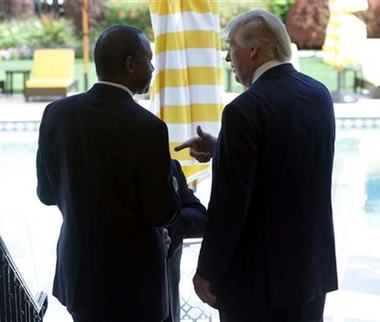Two Donald Trumps? Depends on which one you ask.

Palm Beach, Fla. (AP) — Are there two Donald Trumps? The quiet thinker and the flashy showman?
Depends on which one you ask.
"Perhaps there are two Donald Trumps," the Republican presidential front-runner said during an understated news conference Friday at his over-the-top Mar-a-Lago resort in Palm Beach, Florida. "I'm somebody who is a thinker. I'm a big thinker."
But after more questions from reporters intrigued by what may lie beneath Trump's bombastic public image, the real estate mogul changed his mind.
"I don't think there are two Donald Trumps," he said, making no effort to address the contradiction.
The inquiries were prompted by comments from Ben Carson, the retired neurosurgeon and former presidential candidate who declared his support for Trump earlier in the day. In explaining what drew the soft-spoke doctor to a brash reality television star who once called him "pathological" and compared him to a child molester, Carson said there were two sides to Trump.
"There's the one you see on stage and there's the one who's very cerebral, sits there and considers things very carefully," said Carson, who joined Trump for the news conference. "You can have a very good conversation with him. And that's the Donald Trump that you're going to start seeing more and more of right now."
Even before Carson's comments, Trump was beginning to adjust the public image that he's spent years carefully cultivating, first in the tabloids, then on reality television and social media, and most recently, during his unexpected White House bid.
With the GOP nomination now within sight, he is dialing back some of his rants against his rivals, and he avoided attacking them altogether during Thursday night's debate. He's suggested he may not be such a hardliner on issues like immigration after all, noting that it's important for leaders to have "flexibility" on important matters. He's also been emphasizing party unity, a far cry from the days when he threatened to run for president as an independent if Republican leaders didn't treat him fairly.
Some of Trump's changing public face can be chalked up to the kind of evolution in both tone and policy that presidential candidates generally make when they start looking to broaden their appeal with a general election audience. Trump leads the Republican race after 24 voting contests and could put the GOP nomination out of reach for his rivals if he wins Tuesday's winner-take-all contests in Florida and Ohio.
For Trump, a strong pivot could be crucial if he hopes to have a chance of winning in the fall, when the electorate will be more diverse than the GOP primary voters who cheer his red-meat remarks.
The Republican candidate has a remarkable level of unpopularity for a leading politician, with 67 percent of Americans saying they view the billionaire unfavorably, according to a new ABC News/Washington Post poll. More than half see him as "strongly" unfavorable."
He's spent much of the primary season making comments deemed offensive to minorities and women. He's faced criticism for the aggressive handling of protesters at his rallies and his own comments that can appear to stoke that behavior. And he's also sparked concerns with allies abroad when he's promised to free American intelligence agencies to torture detainees and vowed to temporarily ban non-citizen Muslims from coming to the United States.
Democratic front-runner Hillary Clinton said Thursday that she's been hearing "from a lot of the leaders I know from around the world, and their message basically is, 'What is happening?'"
Even with the baggage he might carry into November, Trump's mixed response on Friday seemed to indicate he sees risks in leaving the public with the impression that there's a softer, gentler, perhaps more moderate man lying just beneath the surface. After all, much of his appeal during the Republican primary has been rooted in his supporters' belief that he tells it like it is, that he won't say one thing to get elected and do another once in office.
Perhaps in an attempt to quell any such concerns, the front-runner closed his news conference with something not often heard in presidential politics: a defense of his supporters for getting physically aggressive with a protester at a recent rally.
"I thought it was very, very appropriate," Trump said. "He was swinging, he was hitting people and the audience hit back."
Then he added, "That's what we need a little bit more of."
By Julie Pace, AP White House Correspondent. Copyright 2016 The Associated Press. All rights reserved. This material may not be published, broadcast, rewritten or redistributed.
The Gayly – March 12, 2016 @ 10:45 a.m.





